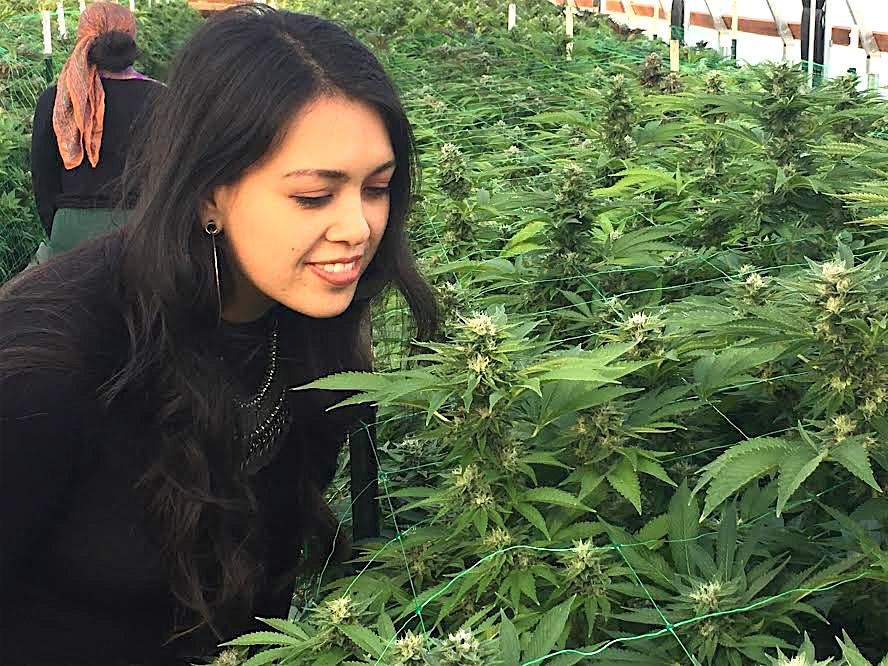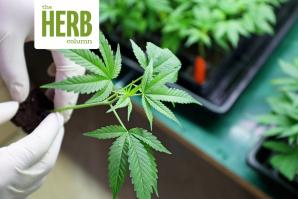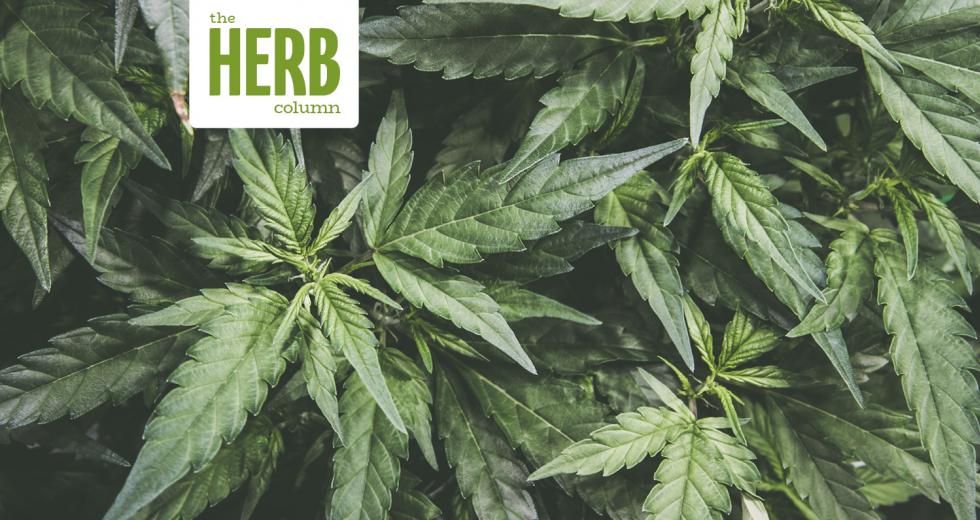On Feb. 4, Mindy Galloway stood on the main stage of a ballroom
in Santa Monica’s Fairmont Miramar Hotel & Bungalows, pitching at
2020Vision, a large gathering of cannabis investors. Galloway
recalls that she and her colleagues at the Sacramento-based
company Khemia Manufacturing viewed success at the conference as
essential — in her industry,
access to capital is the No. 1 problem. The conference was
convened by The Arcview
Group, which
Forbes describes as a “top marijuana investment and research
firm.”
By the time she stood on that stage, Galloway already had an
impressive story to tell. Over the course of six months in 2019,
bootstrapping with $200,000, Khemia had gone from concept to
product delivery. Key to its mission and brand, the company had
partnered with growers, including several in Yolo County and
Nevada County, who practice regenerative farming techniques,
which incorporate ecological principles to improve soil, protect
water quality and combat climate change.
Mindy Galloway takes a tour of the Best Organic Medicine farm in
Yolo County. (Photo courtesy of Mindy Galloway)

Galloway announced at 2020Vision that Khemia was launching a $1
million seed-funding round. Since then, the company has raised
$400,000 and Galloway says she’s confident that the rest will
arrive. Since the event, at which time Khemia was licensed only
to package and distribute flowers, Khemia has received a license
to make cannabis-infused products including tinctures and
lotions. Galloway is seeking licensing to perform every type of
cannabis-involved manufacturing.
Comstock’s spoke with Galloway about Khemia’s all-female
management team, its “heart-centered” business practice and
its plans for growth.
You grew up in the cannabis industry. Can you tell us
about that?
When I was a teenager (in Sacramento), between 2003 and 2008, my
friend’s parents were part of two small collectives. I would go
trim, and then we would manufacture butter or hash with the trim
as a way to make use of every part of the plant. So I’ve been
making cannabis products on a very small scale for a very long
time. And now that we’re entering this new era, we want to do it
on a commercial scale, but we want to keep in line with the
“made-by-hand” tradition.
You work exclusively with growers who practice
regenerative farming, outdoors and under the sun. Why is
that?
There’s a lot of science behind cannabis, and there’s a greater
understanding of the components that comprise it and their
effects. In addition to the cannabinoids — the THC and the CBD —
we also have terpenes, the essential oils of the plant, which
help give it its different effects. So when we say sativas are
uplifting and indicas are more sedating, it’s because of the
terpenes. And when you have the combination of regenerative
practices, healthy soil and the actual rays of the sun — and the
rays of the moon — they all work together to
grow the plant in a harmonious way, and the effects are
enhanced.
In addition to the science, is there an ethical
component that guided your decision?
Yes, of course. We love plants and we love the Earth and we want
to make sure that we’re doing our part there, as well. That’s why
we were so intent on finding compostable packaging, which ended
up being really hard. When I was first starting out, I was like,
“How come this isn’t more widely available?” Being conscious of
this and being on the forefront of this in the industry feels
good. …
We do everything with the conscious mind at the forefront. That’s
why we tell the stories of our farms on our packages. And that’s
why our facility implements more of a heart-centered business
culture that values stewardship over hierarchy. For example, when
we create standard operating procedures, we form a workgroup and
walk through the processes with the employees that are actually
performing the work day-in and day-out. We listen to their ideas,
everyone gives feedback, and we refine the process in a way that
works the best. This helps our employees feel appreciated and
listened-to, which adds value to the position they are in.
Why did you choose to operate as a 100-percent
female-run company?
This is my personal opinion, but there’s a very big imbalance in
the way business is run. Most business is very analytical, very
competitive, very driven. That comes from a very male or
masculine part of the brain. From the feminine side, there’s a
lot of intuition and care about collaboration. I think you need
both — you need the drive, the passion and the force of that
masculine energy, but you also need to be emotionally
intelligent. You need to create a beautiful environment for your
employees.
My goal with having a female leadership team is to help cultivate
the idea in the business world and inspire others — not just in
the cannabis industry. Eventually, more women will get to have
positions of high power. In the investment world, only about
2 percent
of women succeed in raising venture capital. And I do think
that’s attributable to the number of venture-capital investors
who are women.
I understand you are participating in the City of
Sacramento’s
equity program, as well.
Yes. I’m lucky in that the City of Sacramento has really embraced
commercial cannabis — the state granted the cities and counties
the option of whether to allow these businesses within their
boundaries, and Sacramento is one of the few cities that has an
equity program. So our recruiting for employees takes place in
ZIP codes and communities that have been affected by the war on
drugs, and also among veterans and people who have been
incarcerated because of the war on drugs.
Do you have an MBA or a business
degree?
I do not. I do have a lot of mentors who have helped me through
what’s basically been an incubator program. I worked for
(Sacramento dispensary) A Therapeutic
Alternative, which (owner) Kimberly Cargile uses as a
platform to help cultivate leaders in the industry. I was able to
learn all the ins and outs of the business by helping her run
that business. Some years ago, when I knew that I wanted to step
into a position as a CEO, I created a mastermind group for women
CEOs in the cannabis space. I’ve learned a lot about how
brainstorming and support and a solid network can help you figure
out what you need to do and get it done.
Where do you see things headed for Khemia in the long
run?
A big part of this for me has been to help the industry
transition to the regulated commercial market. I’m like a mother
company. When the industry changed in 2018, some people who had
been making products for 10 or 20 years, all of a sudden they are
out of business. Their city says, “You can’t do this here.” Or
they face barriers of entry, first of all financing; we’re unique
as an industry in that you can’t just go get a bank loan.
So Khemia was formed as a way to bring everybody under one bigger company so we can all create something together instead of doing it all individually on our own. So again — it’s a lot about the heart-centered business model that values collaboration over competition.
Recommended For You

The Herb Column: High Hopes in El Dorado County
The passage of five ballot measures in 2018 could lead to a thriving legal marijuana industry
Many local leaders and members of the commercial cannabis community are still optimistic about the November 2018 passage of five ballot measures in El Dorado County that lay the groundwork for a fully legalized and regulated cannabis industry.

The Herb Column: Is Onsite Smoking on Its Way?
Sacramento City Council could soon decide whether to permit people to light up in smoking lounges and cafes
For proponents of legal cannabis, Prop. 64 will forever be a landmark. But another ballot measure — Prop. 65, passed 30 years earlier in 1986 — gets almost no attention, although it also affects state government’s approach to cannabis.

The Herb Column: SMUD Sees Green Energy
Sacramento’s municipal power company is helping cannabis-growing customers be more energy efficient
SMUD is exploring ways to meet increased energy demands where cannabis cultivation operations are concentrated.

The Herb Column: Higher Education
Budtenders may become the new drug educators in Sacramento
The legalization of adult-use marijuana in November 2016 created an opportunity for California to rethink drug education programs, as a portion of the tax revenue from the new commercial cannabis market must go to education programs.



